
The story broke last week…
…and as you might expect, it went viral.
A woman from the Dallas area, Brandy Bottone (pictured), was pulled over by the police last week. Why? She was driving by herself in the HOV lane. In Dallas, that’s a $275 ticket.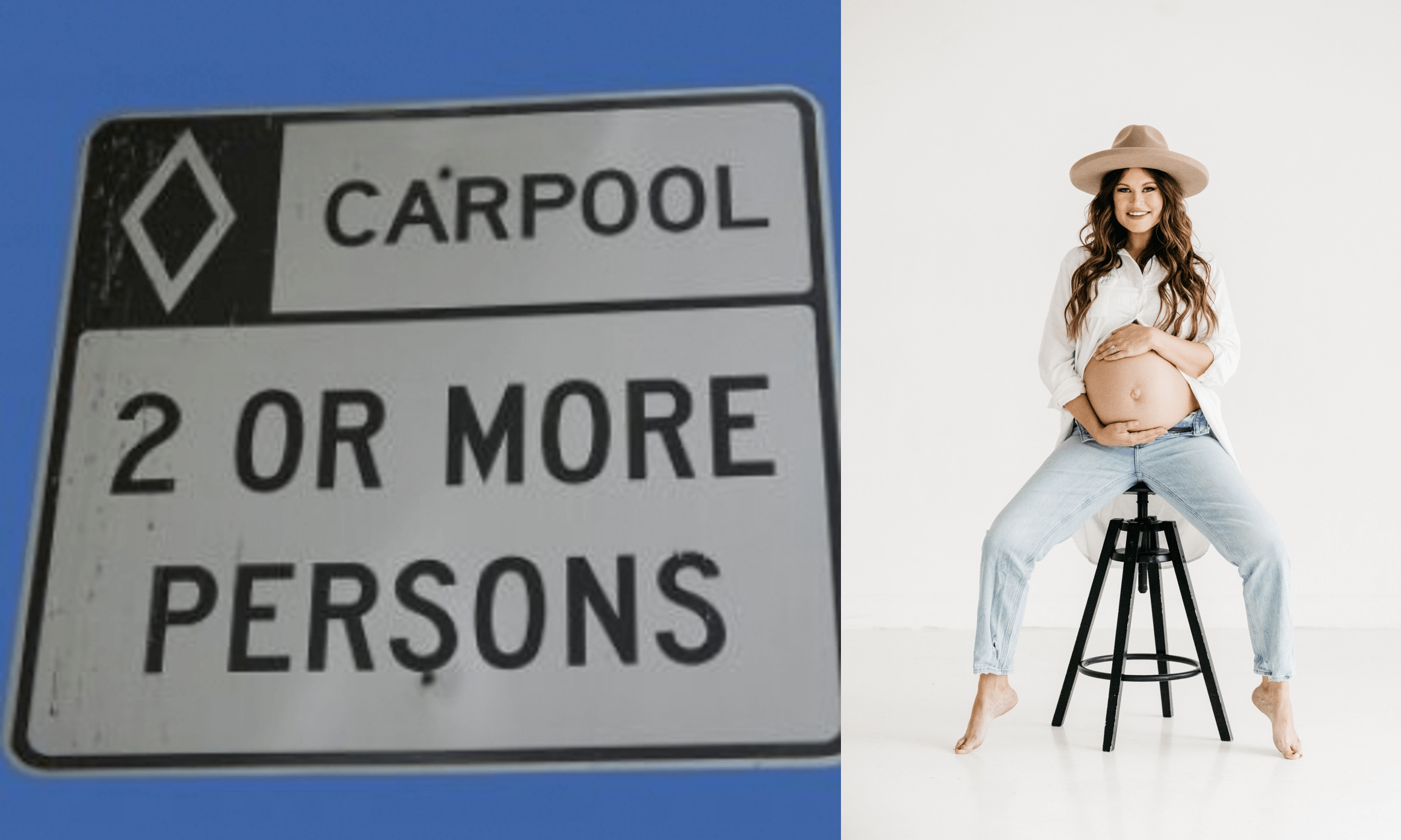
It might have been a great story. If radio covered it.
But how many stations and radio personalities looked at the story, and chose to leave it on the cutting room floor because of the potential controversy it would stir up among the least tolerant cumers?
Welcome to Radio 2022, where only conservative talk stations would dare to go there.
I also noted there’s not a GoFundMe page to help Ms. Bottone pay for that ticket and any legal fees incurred if she chooses to argue it in court. Under “normal” circumstances, that might make a great bit.
But these are not “normal circumstances. Far from it.
In last year’s AQ3, radio’s only research study dedicated to air talent, we asked this agree/disagree question:
“I’m concerned about covering topics that may offend certain members of the station audience/my audience.”
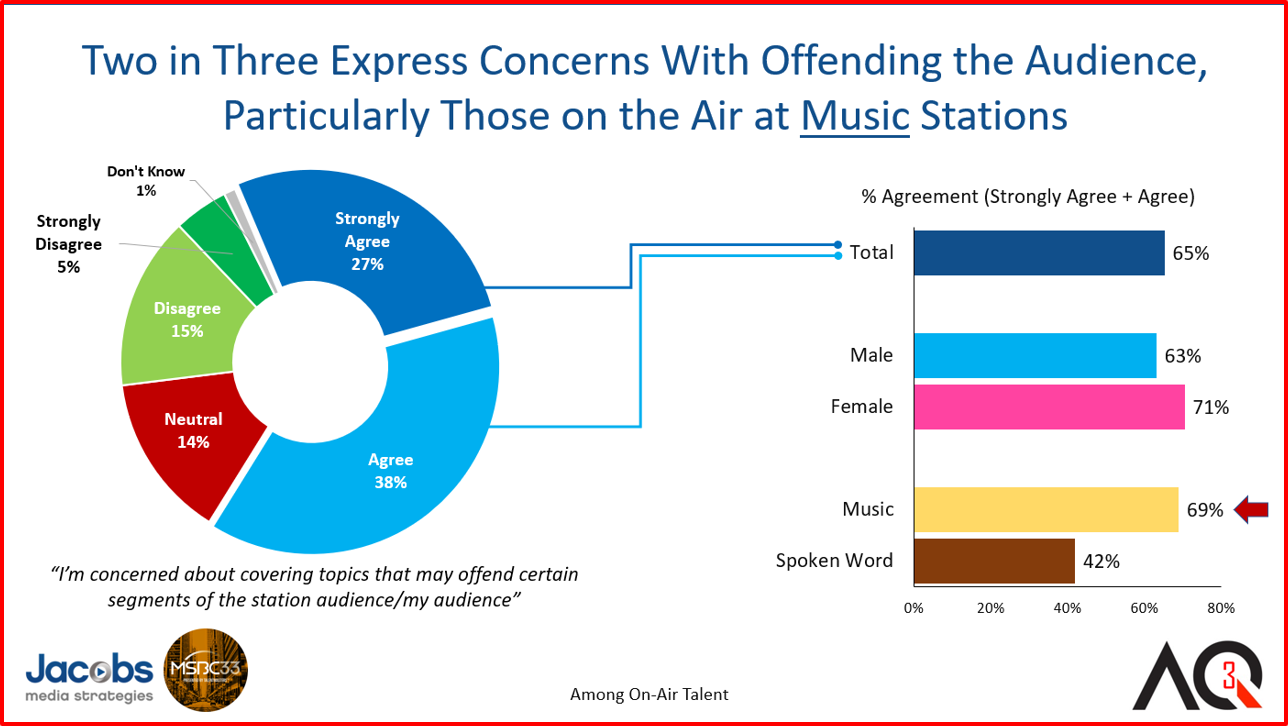
It will come as no surprise to you that women on the air and personalities on music stations are most hesitant to include stories that might upset or rile the cume. AQ4 launches tomorrow, and this question will be repeated for tracking purposes. My expectation is the results here in 2022 will resemble this chart – or perhaps, might even discourage talent and their PDs to shy away from anything that might cause turbulence.
Here we are at the midpoint of the year, and once again, politics is in the air.
Many states still have primaries coming up in the next several weeks. And the midterm election will be here in the blink of an eye. Analysts estimate that before all is said and done, nearly $8 billion will end up being spent during this cycle. Television stations, as always, will reap the benefits as they always do. But broadcast radio is also in a position to take in mountains of cash, especially based on the results of the 2020 election.
I blogged about this on several occasions back in 2020 as Joe Biden utilized radio rather extensively two years ago in his run against Donald Trump. It appeared to work – he got elected, after all – but not across the board. Despite placing substantial buys on Latino-targeted stations, the Biden campaign fell well short of its goals with this community. And according to a recent story in the New York Times, his credibility gap with that community has only widened.
As we head into yet another volatile political season, it’s clear there will be no shortage of taking stands – controversial ones – during radio station stopsets, that is. That’s the place when multiple commercials will likely be political ads for incumbents, up-and-comers, radicals, hardcore conservatives, progressives, and every proposition imaginable. But only a handful of music radio stations will actually speak out on those same issues during the other 50 minutes (give or take) an hour).
when multiple commercials will likely be political ads for incumbents, up-and-comers, radicals, hardcore conservatives, progressives, and every proposition imaginable. But only a handful of music radio stations will actually speak out on those same issues during the other 50 minutes (give or take) an hour).
Except on conservative talk stations, of course.
Last week, The New York Times ran a controversial story breaking down “misinformation” on these radio stations, and how it goes unaddressed by anyone – the FCC, companies that own these stations, etc.
The story – “On Conservative Radio, Misleading Message Is Clear: ‘Democrats Cheat'” – by Stuart A. Thompson beaks down how some stations all over this country are unafraid to take controversial stands, especially when it comes to the Trump playbook: the election was stolen, the other party rigged the election, etc. You know the tropes.
And commentators on MSNBC, CNN, and in papers like the Times and the Washington Post lament how so many Americans buy these arguments – lock, stock and barrel.
I think the answer’s simple:
Radio works.
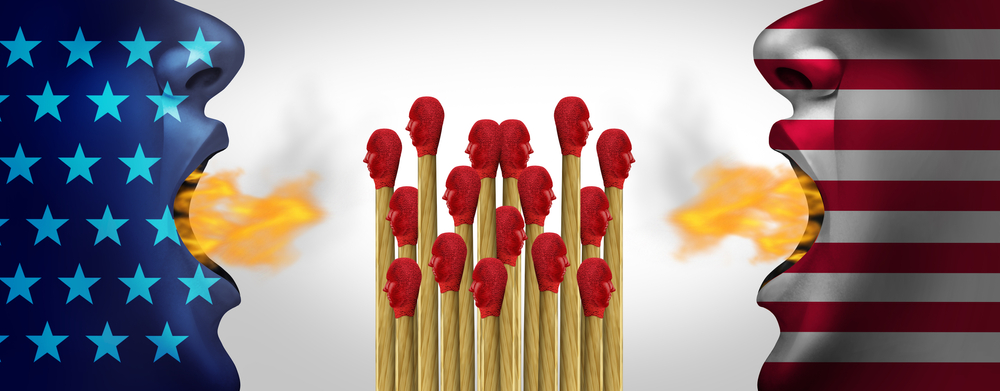 Despite it’s sagging engagement and influence in many quarters, radio – especially of the conservative talk variety – holds sway with millions of Americans.
Despite it’s sagging engagement and influence in many quarters, radio – especially of the conservative talk variety – holds sway with millions of Americans.
Better put, it is their army of personalities, from Sean Hannity, Laura Ingraham, and Ben Shapiro on the national level, as well as scores on local stations from sea to shining sea whose microphones still very much matter.
Here’s the money quote from Thompson:
“Radio remains perhaps the most influential conduit for right-wing thought, despite the rise of podcasts and social media. Tens of millions of people nationwide, especially older Americans and blue-collar workers, listen to it regularly…Talk radio is also uniquely difficult to analyze and harder to moderate, because the on-air musings from hosts usually disappear over the airwaves in an instant.”
So why doesn’t it work both ways?
It sure does on cable news, where you don’t need a scorecard to know where Fox News, MSNBC, and CNN stand politically. When asked why there isn’t the liberal equivalent of Glenn Beck, Mark Levin, and Dana Loesch on AM and FM radio stations, pundits will tell you the uprising and vitriol that would come spewing from the other side would be tsunami-like. Or that liberals just won’t listen to talk, even if it supports their politics.
Yet, somehow on television and in print, it works just fine. Same with the late night hosts, many of whom have been pointedly critical of the MAGA crowd and its leadership. Kimmel, Fallon, Colbert, Oliver, Noah, Bee, and others pull no punches in their monologues and bits. Or SNL.
While Bill Maher may be shifting his political venom, he has historically sarcastically blasted the entire spectrum on his “Real Time” commentary show. No matter what he says, viewers are still subscribing to HBO (and now HBO Max). In fact, even in a more competitive video streaming environment, their numbers are impressively rising.
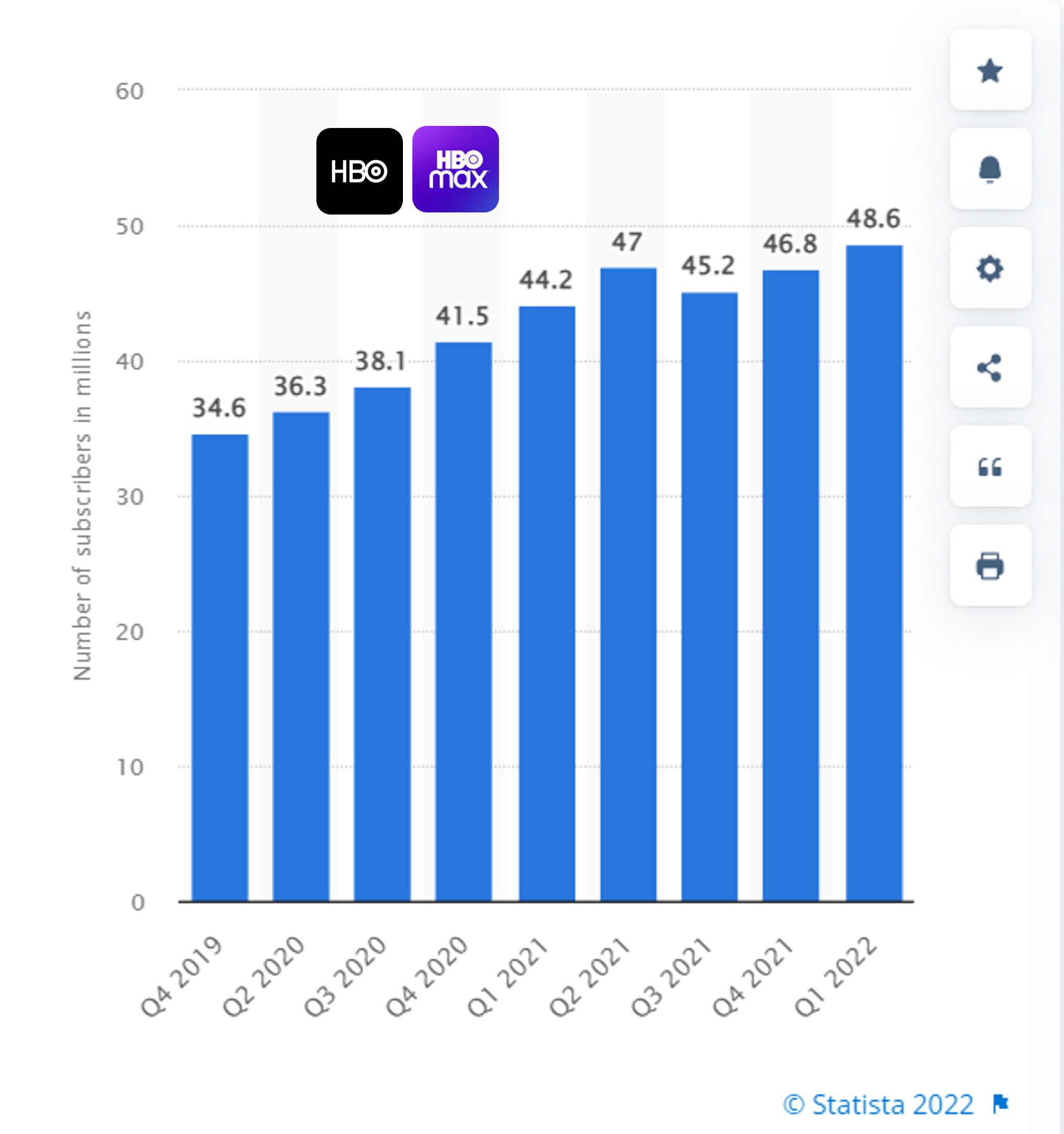
How do left-wingers in other media pull it off, but never on commercial radio? I have had this conversation with many bright radio people over the years, and some say the late night crowd and political humor shows have great writers, legions of talented people who can write witting jokes, one-liners, and bits. But somehow all those local conservative hosts make out just fine without great writers or even skilled producers. Their ideologies carry the content.
Some will also point to the failure of Air America as proof positive liberals won’t support radio with a firm left-leaning position. If you remember, that network was positioned as radio’s antidote to Rush.
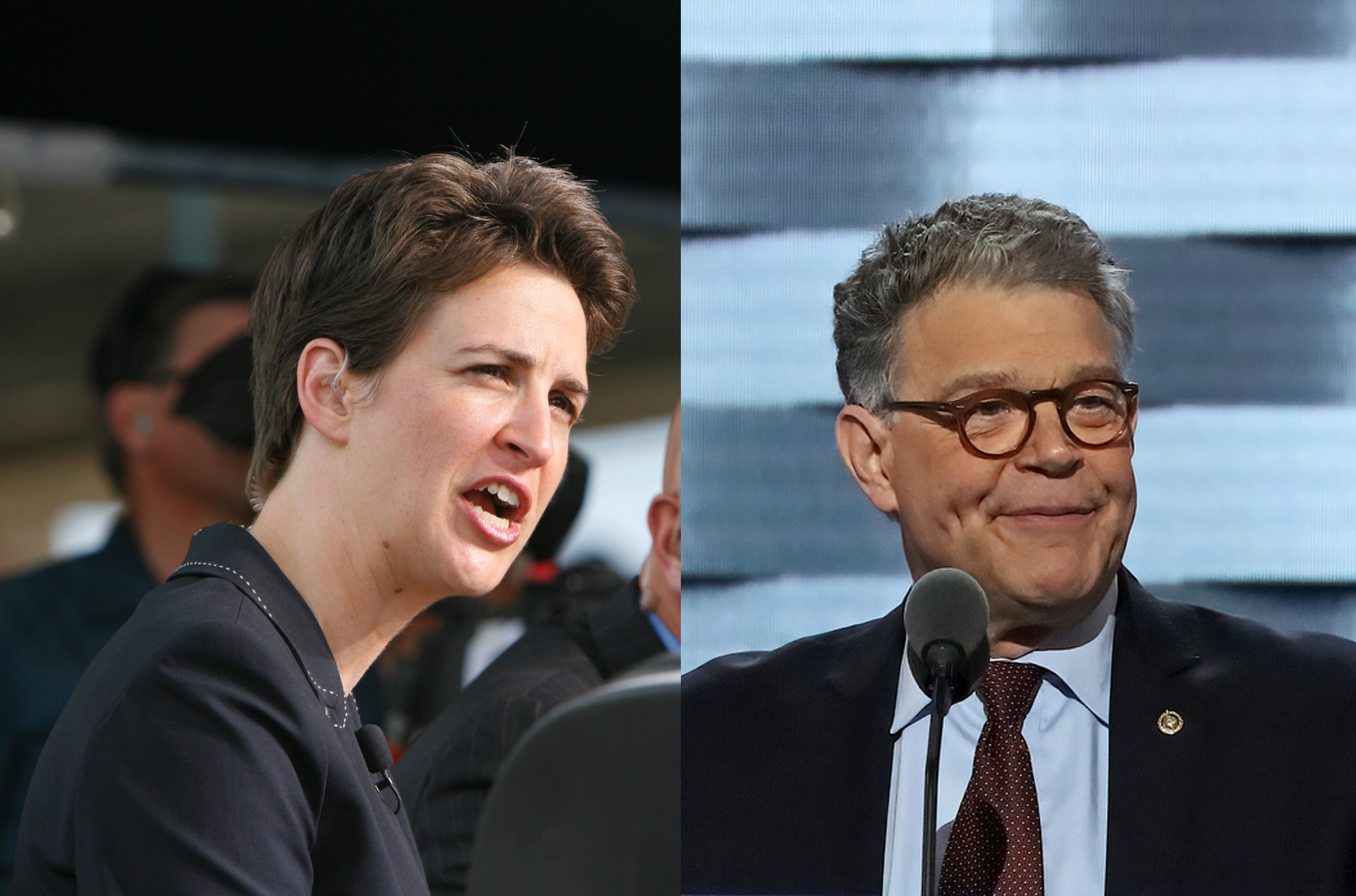
Air America had a six-year run (2004-10), and some shows attracted 1 million+ listeners each week. Hosts included talented people you’ve heard of – Rachel Maddow, Al Franken, Ron Reagan, Jr., and even Marc Maron. The talent was there, but the network had all sorts of off-the-court issues, including financial setbacks.
But many have concluded that Air America’s inability to sustain itself is proof positive liberals won’t support a radio product. Back in 2019, I watched Randy Michaels address the “Talk Show Boot Camp.” Many credit Randy with creating the conservative talk model in Cincinnati.
But he made the case that a liberal product ought to work just as well. It just happened to be a a better fit for southern Ohio (Kentucky) listeners back in the day. Still, the crowd watching Randy speak was primarily made up of older white guys – the same demographics that have made talk radio in the U.S. what it is today.
And that bring us back to Music Radio Programming 101 – the part of the content strategy that dictates avoiding controversy at all costs. The conventional wisdom is that American society is so polarized that consumers don’t listen to the radio to engage in political discourse. Instead, they tune into music radio stations for escape – to get away from the crossfire of anger and finger-pointing.
Some might also say that’s what NPR and public radio are all about. And while it is abundantly true its audience has a hard left lean, programs like “Morning Edition” and “All Things Considered,” and hosts like Terry Gross and Steve Inskeep go out of their respective way to remain centered, fair, and nonpartial.
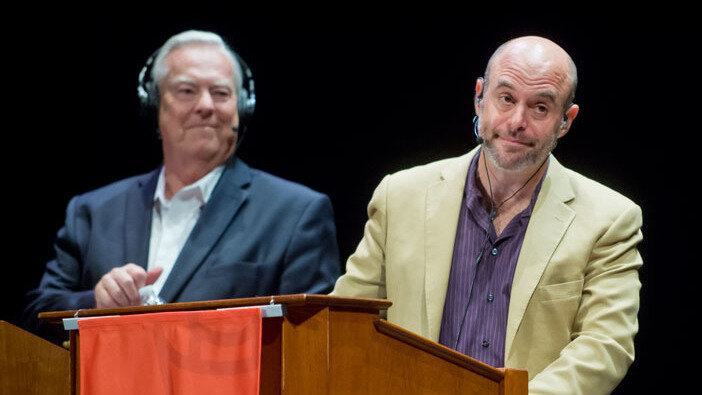
Does it work? Of course, that’s in the ear of the beholder, but stylistically, public radio personalities and conservative talk hosts couldn’t be further apart on the presentation spectrum. You’d never mistake Dan Bongino’s style for Peter Sagal’s snark (host of “Wait, Wait…Don’t Tell Me!” and pictured here).
But at the end of the political day, does it matter? What’s the cost of music radio avoiding controversial topics? And if personalities on rock or AC stations ventured into some of these issues, what would be the cost?
Right now, two of the biggest – and most controversial issues – are on the tips of many tongues. At coffee shops, bars, card games, and barbeques, people are talking about abortion and guns. Why on earth would anyone on the air at a music station wander into these war zones?
Well, for starters, a majority of Americans are pretty clear about their feelings. Unlike many controversies that are divided right down the center, there are clearly majorities lined up on both issues:

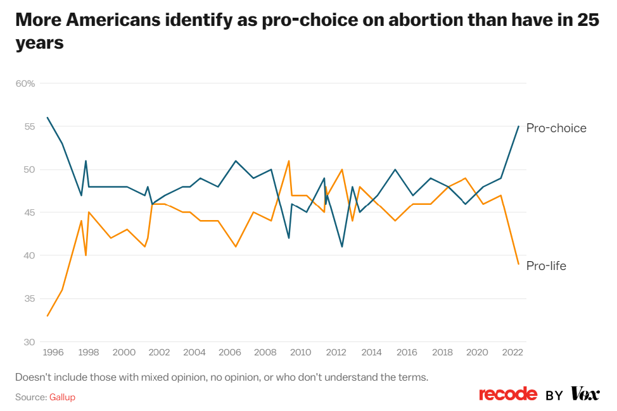
So, what’s the problem? Program directors of music stations are understandably hesitant to allow these conversations on the air. In spite of their currency and timeliness, personalities and their stations that have created no expectations for this type of content would most likely be disappointed if they started now. In these cases, it is hard to justify a 180° turn from talking about the Rolling Stones to Roe v. Wade.
All these decisions should be done in concert with the station’s core team, and in many cases, ownership. There’s a lot on the line reputationally, as well as with revenue. These are highly nuanced calculations that require research, in-depth brand knowledge, and a deep understanding of the audience.
That was why I sat up when I saw a suprising story about a Classic Rock station in Boise, Idaho – 96.9 The Eagle. Actually, the story appeared in two very different publications, the Idaho Statesman, the main newspaper in the state, owned by McClatchy. And the Eagle story was also covered by LGBTQ Nation, a site that’s been in operation since 2010.
What’s the story all about? This:

As Statesman reporter Michael Deeds notes, the Eagle appears to be your standard issue Classic Rock station – rock girls front and center on the station homepage, Bob & Tom in the morning, and core artists that include Van Halen, Def Leppard, and Queen.
But for the last two years, KKGL has changed out its regular logo on June 1st in honor of Pride Month. In a fire engine red state like Idaho, you can only imagine the breadth of reactions – many of them negative.
And in response, the Eagle fired back with this message on Facebook:
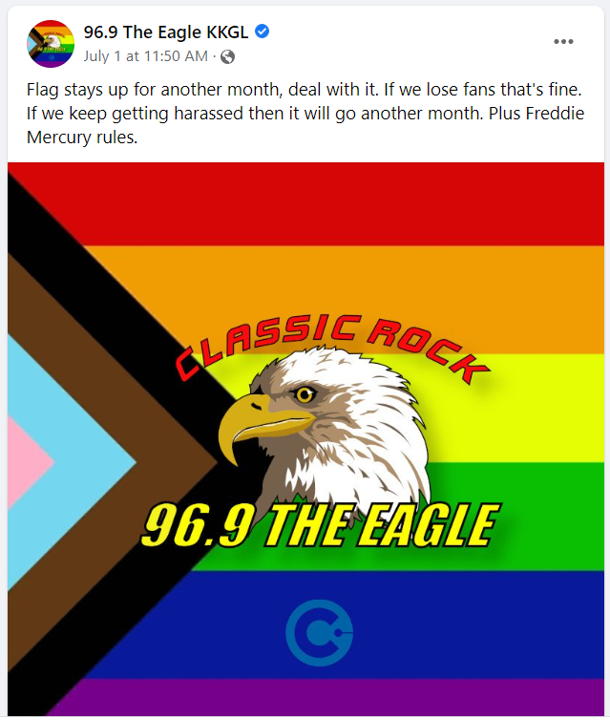
In case you’re wondering, that defiant post has generated more than 4,000 comments along with nearly that many shares.
Given this is the second year in a row KKGL has taken the same stance, you won’t be surprised to learn their Facebook page has amassed nearly 387,000 follows and close to 380,000 likes. That’s well more than twice as many Facebook fans as any rock station has in New York, L.A., and Chicago.
(I would be remiss if I didn’t let you now the spring Nielsen book ran until June 22.)
I am not neither criticizing nor am I endorsing the Eagle’s tactics or their commitment. I don’t know their brand equity or their relationship with their audience. But I do admire their spirit and their courage.
Should your station or leading personality undertake something similar?
 Yes. No. I don’t know.
Yes. No. I don’t know.
There is no pat answer, especially if taking a stand about the issues of the day runs counter to what your audience expects from you. On the other hand, could you cover a story like the pregnant woman in the HOV lane. Maybe you can. But it still needs to be well-played. Does it become a punchline, a jump ball, or something else entirely?
In other words, this type of content requires quite a bit more forethought and prep than another round of “Second Date Update.”
So proceed with caution…much caution. And maybe at the end of the day, you’re better off doing “War of the Roses.’ There’s no shame in that.
Knowing yourself, knowing your station, knowing your audience.
These are the content building blocks that will either greenlight content or shut it down.
But I do believe this….
The broadcast radio industry – especially on the other side of the talk coin and on music stations – has left audience and money on the table. Other media prove there’s a “there there” each and every campaign and election cycle.
We are only becoming more politicized as a society, like it or not.
That’s something to talk about.
Thanks, Dave Beasing.
- Media And Technology In 2025: Believe It Or Not! - April 18, 2025
- In Radio, You Just Never Know - April 17, 2025
- The Secret To Making A Great Podcast (And Great Radio) - April 16, 2025




Knowing your audience is the thing. I know this…my audience prefers to have at least one thing in their lives that hasn’t been politicized. I feel the same…when nearly everything is made political…not just your vote, but the media you consume, the car you drive, even the food you eat…people get sick of it.
My station, and my show, especially, remains an escape from all that.
Does that mean I might lose some listeners? Probably. But I’m willing to deal with that.
Don, totally valid. When you have a strong sense for who your auience is and what they need from you, it gets much easier. Thanks for chiming in.
Lots of sides on the pregnant woman story. One side suggests (and I haven’t really seen a lot on this ) that the officer should have exercised his option and let her go. (Police attack pregnant woman.) One side brings out the frustration and irony that’s developed over “opinions” – including SCOTUS. One side suggests the strength of a woman who should be applauded for her courage to stick with this. One side suggests that maybe society’s legislative agenda is a little too invasive. Music stations (in my opinion) could (and should) report this story and stick to the facts, allowing the listener to decide their own opinion. This woman brought out the vagueness of a law that isn’t specifically spelled out, based on recent developments. No one was hurt. There are a lot of areas where music stations shouldn’t tread, but the number of areas covered by this story should have sparked creative thinkers to use what makes live, local morning music radio special. If anything, this story can open more doors to being more relatable.
Dave, precisely my point. Rather than bloviating about guns, abortion, January 6th, or even why gas prices are so high, talent needs to find ways to make these kitchen table topics interesting and (in most cases), no political. Not easy, but if it were, anybody could do it.
This is really a great question, and one that I’m sure people like me wrestle with a lot. I’m doing (among other things) a morning show is ruby red Northern Michigan, and so far am getting great feedback from avoiding actual topics like this. And my proudest moment was the day the PD got two complaints about me – one that I was “way too conservative” on the air, and another about how I was a “raging liberal” on the air. And those both came on the same day. I see your point taken here, just not sure I know how to do anything but avoid it.
Mark, given your geography and your market/audience knowledge, you are very likely in the right place. Obviously, people appreciate that the station doesn’t get opinionated or political. For stations like yours, that’s a perfectly valid position.
As I wrote (for Radio World), last year:
• “Be for everybody” (a paraphrase of the late, great Tom Petty) — which, I propose, for *music* radio, in particular, means: Avoiding politics (because, as you wrote in your piece and Don Collett suggested in his comment: listening to music on the radio is often used as a reprieve from all the cultural noise).
• Know your audience (a point you and commenters echo) … and, crucially, “Stick to the knitting” (which, together, can be interpreted as: Know — and meet — your listeners’ expectations). Or, in other words: If they’re not coming to your station for divisive political talk, don’t send them fleeing … by giving them unexpected political rancor (that they didn’t want … or expect from your show/station).
That said, I also agree with Dave Mason’s analysis of the story about the pregnant woman driving in the carpool lane: Done right, it’s a topic that could be handled in an apolitical — and potentially very compelling — way on the air.
Good topic. My full Radio World piece (Aug. 23, 2021):
https://www.radioworld.com/columns-and-views/guest-commentaries/radio-stick-to-your-knitting
Good, well-thought out comments in the Radio World piece, Mike. It really is possible to not be “bland” without alienating half of your audience. I spent most of a lifetime doing–and loving–it. I think you–and Mr. Petty–are right. Thanks.
A couple additional comments (since, as a blog — and not a radio station — it’s probably OK to get a little “political” here):
• Upon reading, a couple days ago, the NYTimes piece about “Conservative Radio,” it originally struck me as more of the usual drivel from the paper. Although the article itself had some balance (by, for instance, including a few quotes from conservative talkers), it was, in my opinion, on the whole mainly just a hit piece against conservative talk radio. Even the online headline (“On Conservative Radio, Misleading Message Is Clear: ‘Democrats Cheat’”) is biased and wordy: Referring to a “message” (which is then placed inside single-quote marks: ‘Democrats Cheat’) already suggests the message might be open to question (without redundantly adding the word “misleading” — which itself might be misleading).
The very nature of cheating is that it’s conducted surreptitiously. I suspect there are both Democrats and Republicans who cheat (and only history might show how much actual cheating occurred in 2020).
• As for “The Eagle” (the classic-rock radio station that boldly posted a “Pride” flag image): I hadn’t heard about this … but it reminded me of a story I recently read about a British bank that told a customer (via social media, of course) who disagreed with the bank’s pushing its cultural values: “If you disagree with our values, you’re welcome to close your account.”
The article suggests it’s a strange and new, but growing, phenomenon for businesses to tell customers, essentially, “take your business elsewhere.” The result? Apparently a certain number of customers did close their accounts — over what the article suggests was an overly “aggressive” social-media response likely not from the bank CEO, but rather from its “millennial 20-somethings running the Twitter feed.” (Full article: https://www.lifesitenews.com/news/close-your-account-british-bank-threatens-customers-who-disagree-with-new-pronoun-policy/)
But, getting back to “The Eagle”: So it might’ve gained a few “Likes” and picked up some new followers. But I say: Who cares? It’s social media; so, it’s not surprising a story like that would generate such a response. My question: How many of those “Likes” and new follows came from bodies with ears that actually listen to the station within KKGL’s own “backyard” (its local market)? As I suggested in my Radio World piece: Why would you want to potentially tick off half your audience — especially at a time when legacy radio is already struggling for audience share?
And, importantly: Is KKGL’s social-media policy from genuine corporate decisions and based on: Knowing Your Audience? Or is it being formulated, on the fly, mainly by “millennial 20-somethings running [its] Twitter feed”?
Rather than Facebook “Likes” and followers, I’d be much more interested in seeing the station’s ratings — which could be much more revealing after the station essentially told some of its customers to go away — a few books from now.
I’ll sidestep the political part of this because (surprise!) looks like everyone already has their opinions. But I will say putting quotations around words when not directly quoting someone is misleading and in fact, can be quite damaging. The New York Times itself had an article admitting that former Present Ford never told New Yorkers to “Drop Dead,” even though–with quotations–that headline ran in their paper. The linked article below opens with the words, “Gerald R. Ford and Marie Antoinette did not have much in common, but being misquoted cost both of them their jobs.” I was watching a rerun of a TV show from the 90’s recently where a progressive teacher has this newspaper framed and on a wall, silently teaching (misinforming) all the students something Ford never said. In fact, it was only out of curiosity that I looked it up and found it wasn’t true. I won’t guess how much lying and cheating Republicans do vs. Democrats. I’m sure there’s plenty to go around. One thing I know. The New York Times did indeed lie when they ran that headline, and decades later people still believe that lie.
https://www.nytimes.com/2006/12/28/nyregion/28veto.html
Sorry to be picky, but The NY Times didn’t run that headline – the Daily News did.
Thanks, Mark. My mistake. I just looked at it again and you’re right. I just saw it on the wall on a TV show and when I searched the story online, it had the NYT banner. I wrongly assumed the NYT was the originating paper. Appreciate the correction. And please, be “picky” anytime you spot an error. That’s how we (hopefully) learn.
“No reasonable person would conclude that the statements were truly statements of fact,” – The former Grifter in Chief’s lawyer’s defense in court to her claims of election fraud.
Let’s stop with the fallacy that any of these people believe their election LIES. They are fine LYING to the rubes, but when they are hauled into court (when they can’t avoid it) where there are consequences for their LIES, their defense is “hey, we can’t help it if our rubes are stupid”.
But yes, let’s keep trying to be “impartial” and act like it is an “opinion”.
“The truth is incontrovertible. Malice may attack it, ignorance may deride it, but in the end, there it is.”
― Winston S. Churchill
And, while we’re on the subject, …
“Guard against the impostures of pretended patriotism.” ~ Geo. Washington
“The difference between genius and stupidity is that genius has its limits.” ~ A. Einstein
“If my fellow citizens want to go to hell, I will help them. It’s my job.” ~ O.W. Holmes
“The best argument against democracy is a five-minute conversation with the average voter.” ~ W. Churchill
“Those who are capable of tyranny are capable of perjury to sustain it.” ~ Lysander Spooner
“Think how stupid the average person is. Then consider that, by definition, half the people are even stupider than that.” ~ G. Carlin
“Neither can his mind be thought to be in tune, whose words do jarre,
nor his reason in frame, whose sentence is preposterous.” ~ Ben Jonson (ca. 1640)
“If you’re not part of the solution, there’s a good deal of money to be made prolonging the problem.” ~ Anon.
“The receptivity of the masses is very limited, their intelligence is small, but their power of forgetting is enormous. In consequence of these facts, all effective propaganda must be limited to a very few points and must harp on these in slogans until the last member of the public understands what you want him to understand by your slogan.” ~ A. Hitler
“Maybe they’re just not high school material.” ~ Pete Gwynn
This excerpt from the New Yorker article “The Lie Factory” on why we are the only western nation without universal healthcare, explains it as well.
“Voters are basically lazy, basically uninterested in making an effort to understand what we’re talking about,” the Nixon adviser William Gavin wrote in a memo. “Reason requires a higher degree of discipline, of concentration; impression is easier,” he wrote in another memo. “Reason pushes the viewer back, it assaults him, it demands that he agree or disagree; impression can envelop him, invite him in, without making an intellectual demand. . . . When we argue with him we demand that he make the effort of replying. We seek to engage his intellect, and for most people this is the most difficult work of all. The emotions are more easily roused, closer to the surface, more malleable.”
Now you know why we can’t have nice things in this country.
Lots of people – especially public radio listener – would agree with your mindset, Mike.